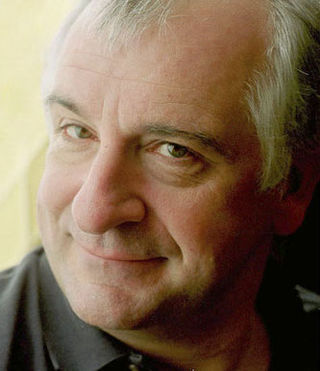
Douglas Noel Adams was an English author, humourist, and screenwriter, best known as the creator of The Hitchhiker's Guide to the Galaxy (HHGTTG). Originally a 1978 BBC radio comedy, The Hitchhiker's Guide to the Galaxy developed into a "trilogy" of five books which sold more than 15 million copies in his lifetime. It was further developed into a television series, several stage plays, comics, a video game, and a 2005 feature film. Adams's contribution to UK radio is commemorated in The Radio Academy's Hall of Fame.
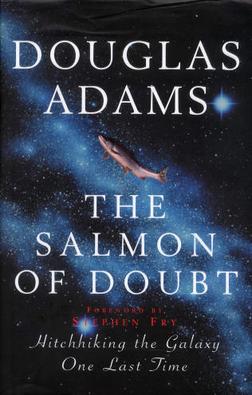
The Salmon of Doubt: Hitchhiking the Galaxy One Last Time is a posthumous collection of previously published and unpublished material by Douglas Adams. It consists largely of essays, interviews, and newspaper/magazine columns about technology and life experiences, but its major selling point is the inclusion of the incomplete novel on which Adams was working at the time of his death, The Salmon of Doubt. English editions of the book were published in the United States and UK on 11 May 2002, exactly one year after the author's death.
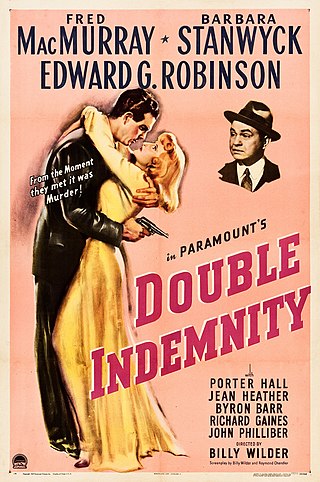
Double Indemnity is a 1944 American film noir directed by Billy Wilder and produced by Buddy DeSylva and Joseph Sistrom. Wilder and Raymond Chandler adapted the screenplay from James M. Cain's novel of the same name, which ran as an eight-part serial in Liberty magazine in 1936.
A screenplay, or script, is a written work produced for a film, television show, or video game by screenwriters. A screenplay written for television is also known as a teleplay. Screenplays can be original works or adaptations from existing pieces of writing. A screenplay is a form of narration in which the movements, actions, expressions and dialogue of the characters are described in a certain format. Visual or cinematographic cues may be given, as well as scene descriptions and scene changes.

Doc Savage is a fictional character of the competent man hero type, who first appeared in American pulp magazines during the 1930s and 1940s. Real name Clark Savage Jr., he is a polymathic scientist, explorer, detective, and warrior who "rights wrongs and punishes evildoers." He was created by publisher Henry W. Ralston and editor John L. Nanovic at Street & Smith Publications, with additional material contributed by the series' main writer, Lester Dent. Doc Savage stories were published under the Kenneth Robeson name. The illustrations were by Walter Baumhofer, Paul Orban, Emery Clarke, Modest Stein, and Robert G. Harris.
Professor Bernard Quatermass is a fictional scientist originally created by writer Nigel Kneale for BBC Television. An intelligent and highly moral British scientist, Quatermass is a pioneer of the British space programme, heading the British Experimental Rocket Group. He continually finds himself confronting sinister alien forces that threaten to destroy humanity.

Islam Abduganiyevich Karimov was an Uzbek politician who served as the first president of Uzbekistan, from the country's independence in 1991 until his death in 2016. He was the last First Secretary of the Communist Party of Uzbekistan from 1989 to 1991, when the party was reconstituted as the People's Democratic Party of Uzbekistan (O‘zXDP); he led the O‘zXDP until 1996. He was the President of the Uzbek SSR from 24 March 1990 until he declared the independence of Uzbekistan on 1 September 1991.

Human rights in Uzbekistan have been described as "abysmal" by Human Rights Watch, and the country has received heavy criticism from the UK and the US for alleged arbitrary arrests, religious persecution and torture employed by the government on a regional and national level. Amnesty International stated that freedom of expression, association, and peaceful assembly continue to be restricted, and that relations between gay men are illegal.

Gabriel Arkadyevich Ureklyan, better known as El-Registan (Эль-Регистан), was a Soviet Armenian poet best known for having co-written the lyrics to the Anthem of the Soviet Union
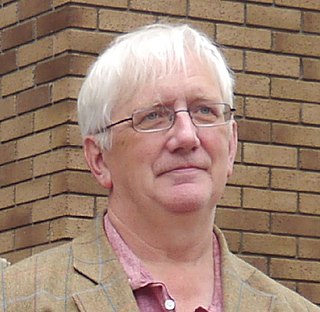
Craig John Murray is a Scottish author, human rights campaigner, journalist, and former diplomat.

Harbinger is an American comic book series published by Valiant Comics about a group of teenage super-powered outcasts known as Harbingers.
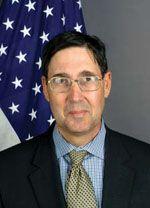
John Edward Herbst is a retired American diplomat who was the United States Ambassador to Uzbekistan from 2000 to 2003 and United States Ambassador to Ukraine from September 2003 to May 2006.
Detective Inspector William Edward "Jack" Frost, GC QPM, is a fictional detective created by R. D. Wingfield—characterised as sloppy, untidy, hopeless with paperwork—but unmatched at solving mysteries. The character has appeared in two radio plays, ten published novels, and a TV series spanning 42 episodes between 1992 and 2010.
Owen Bennett-Jones is a freelance British journalist and a relief presenter of Newshour on the BBC World Service. As a former BBC correspondent having been based in several countries, he also regularly reports from around the world. He currently hosts "The Future of..." on New Books Network.
On 13 May 2005, protests erupted in Andijan, Uzbekistan. At one point, troops from the Uzbek National Security Service (SNB) fired into a crowd of protesters. Estimates of those killed on 13 May range from 187, the official count of the government, to several hundred. A defector from the SNB alleged that 1,500 were killed. The bodies of many of those who died were allegedly hidden in mass graves following the massacre.
Kirsty Williams is a radio drama director and producer for BBC Radio Drama at Pacific Quay, Glasgow.
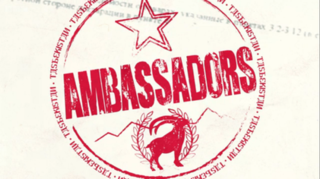
Ambassadors is a three-episode British comedy-drama television serial that ran on BBC Two in 2013. Ambassadors follows the lives of the employees of the British embassy in the fictional Central Asian nation of Tazbekistan.
The 66th Writers Guild of America Awards honor the best film, television, radio and video-game writers of 2013. The television and radio nominees were announced on December 5, 2013. Film nominees were announced on January 3, 2014. All winners were announced on February 1, 2014, at the JW Marriott hotel in the L.A. Live entertainment complex.
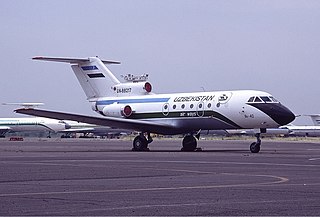
Uzbekistan Airways Flight 1154 (HY1154/UZB1154) was a scheduled domestic passenger flight which was operated by Uzbekistan flag carrier Uzbekistan Airways from Termez Airport in the city of Termez, near the Afghanistan border, to Uzbekistan's capital of Tashkent. On 13 January 2004 the aircraft operating the flight, a Yakovlev Yak-40 registered in Uzbekistan as UK-87985, collided with a radar station while landing at Tashkent, flipped over, caught fire and exploded, killing all 37 people on board. Weather was reportedly sub par for flying.

Dominic Sebastian Schroeder is a British diplomat currently serving as Principal of the International Academy of the Foreign, Commonwealth and Development Office.













